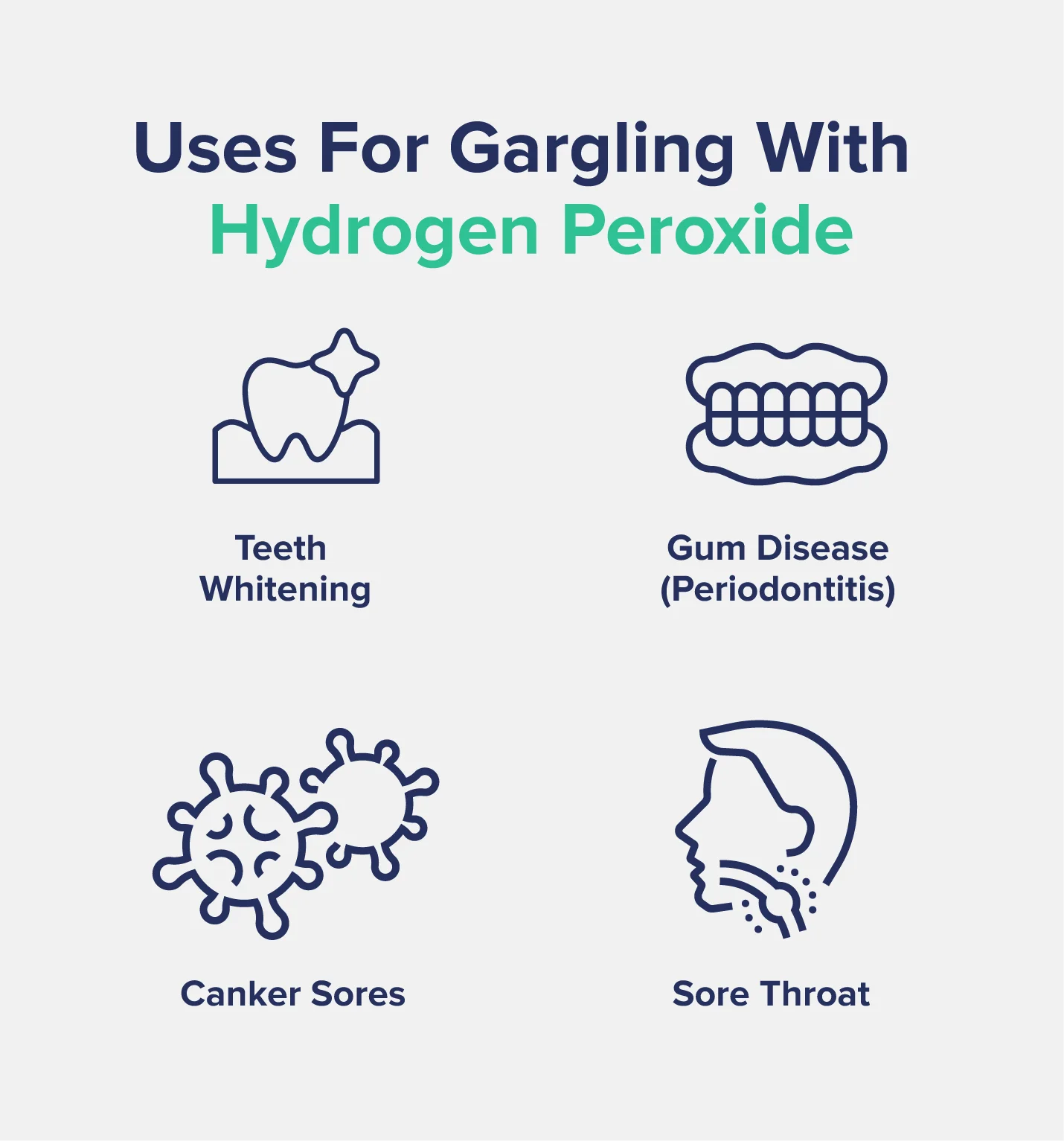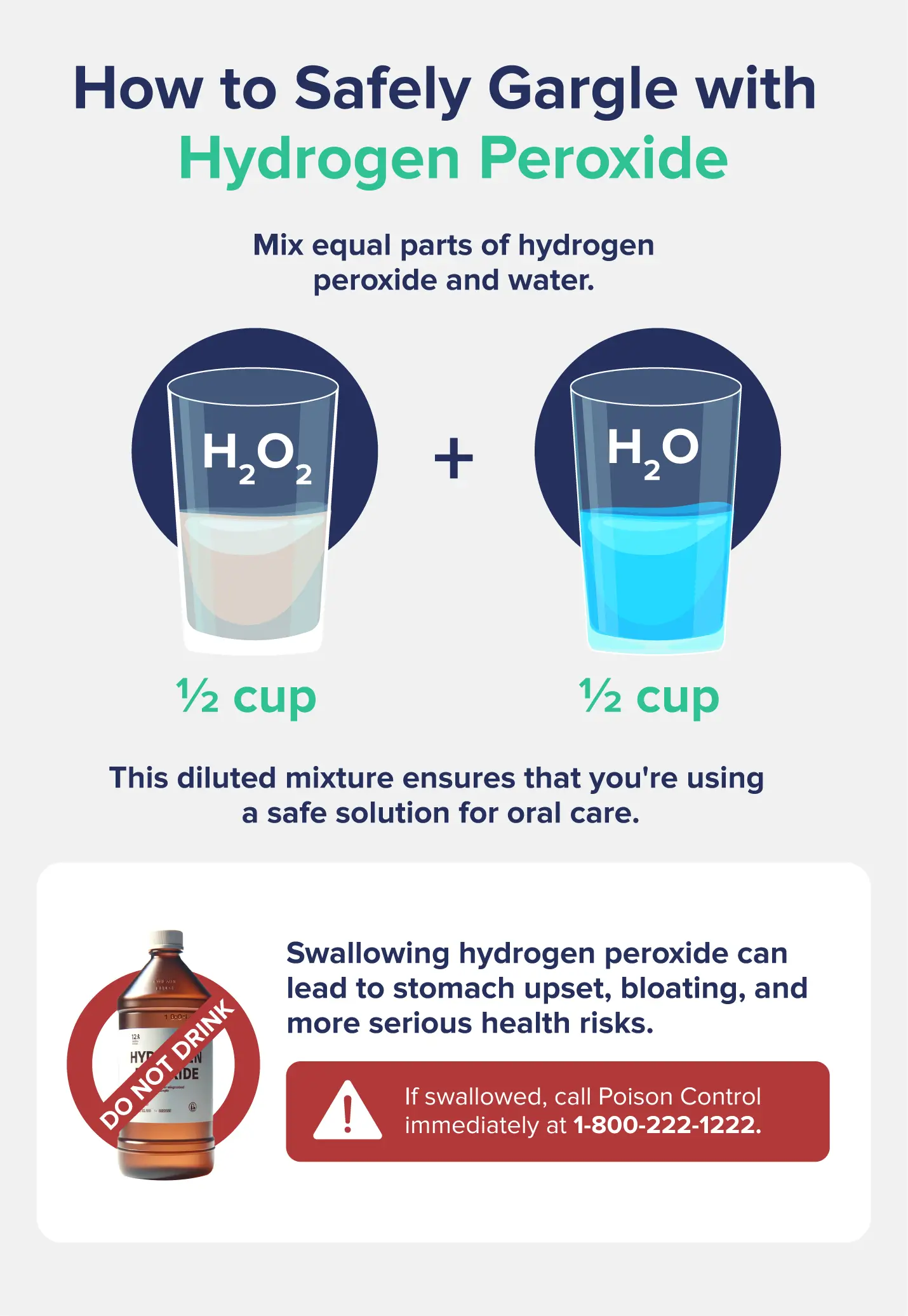Talk to a Registered Dietitian and use INSIDER20 for 20% off!
Talk to a real Dietitian for only $99: Schedule Now
Evidence Based Research To fulfill our commitment to bringing our audience accurate and insightful content, our expert writers and medical reviewers rely on carefully curated research.
Read Our Editorial Policy
Did you know our stomachs are not the first portion of our digestive systems? If that’s surprising to hear, we’ve got a fun fact for you––it’s actually the mouth!
Chewing, salivating, moving food around with our tongues, and swallowing are all part of the digestion process occurring in our mouth, which is why it’s so important to maintain our oral health.
Besides brushing and flossing, gargling with mouthwash can also be beneficial for dental hygiene, especially if you have chronic dry mouth or periodontal disease.
Typically, mouthwashes you see on drugstore shelves use alcohol as the main active ingredient. However, you may also see hydrogen peroxide mouthwashes.
This begs the question: can you skip the brand-name mouthwash and just use the ubiquitous brown bottle you have stashed in the back of your bathroom cabinet?
The answer is yes! Gargling with a diluted hydrogen peroxide solution may have several oral benefits.
Here’s everything we know about the oral and health benefits of using hydrogen peroxide as a mouthwash, plus some important safety tips you need to be aware of before you do so.
Before we dive in, let’s explain what exactly hydrogen peroxide is.
Hydrogen peroxide (H2O2) is an oxidizing agent that can kill bacteria. It does this by releasing oxygen that kills anaerobic bacteria.
As a result, hydrogen peroxide can be used as a mild antiseptic that can disinfect surfaces, as a bleaching agent for clothes and hair, and has several medicinal purposes, too.
Many of these medical uses involve using hydrogen peroxide as oral health mouthwash. Here are a few of them.

Hydrogen peroxide is often used in mouthwash and tooth-whitening products due to its ability to whiten teeth.
As mentioned, hydrogen peroxide is a bleaching agent. It whitens teeth simply by oxidizing the organic particles within your tooth. This lifts stains from the teeth and gives the appearance of a whiter smile.
To create your own whitening mouthwash at home, use a 1-to-1 ratio of hydrogen peroxide to water. Swish this around your mouth for about 30 to 60 seconds. After spitting out the solution, be sure to rinse your mouth.
Be very careful never to swallow hydrogen peroxide mouthwash, whether you’re using a homemade or storebought version.
Do not use a hydrogen peroxide mouthwash more than once or twice a week to whiten your teeth, as this can lead to erosion and cavities.
Hydrogen peroxide can not only be used to improve the appearance of our teeth but also improve our oral health.
In a systematic review of the effects of oral rinsing with hydrogen peroxide, it was found that a 1.5% solution of H2O2 reduced the prevalence of plaque, gingivitis, and oral bacteria compared to a placebo.
The antibacterial properties of hydrogen peroxide can also reduce gum inflammation and may also improve severe periodontitis.
Gargling with hydrogen peroxide can help relieve a sore throat in two ways.
First, if you have a sore throat due to a bacterial infection, the antibacterial properties of hydrogen peroxide can help kill off the bacteria causing the infection.
Second, hydrogen peroxide can also soothe sore throats via the foaming action that occurs when the solution comes into contact with the mucus in your throat, loosening it and making it easier to cough up.
If you’ve ever had a canker sore, you know how painful and annoying it can be. While numbing gels can temporarily soothe the pain from the irritation, it doesn’t address the root problem.
While canker sores can be caused by stress and acidic foods, they can also be caused by minor mouth irritations.
In these cases, it can be helpful to use a hydrogen peroxide oral rinse to kill the bacteria that slows down wound healing.
If you want to take advantage of these health benefits, you can either purchase a mouthwash with hydrogen peroxide or make a diluted hydrogen peroxide solution.
When gargling with hydrogen peroxide, it is extremely important to always use a diluted solution of equal parts hydrogen peroxide (1.5% to 3%) and water. For example, mix ½ cup of 3% hydrogen peroxide with ½ cup of water.
Never swallow hydrogen peroxide!

The reason you should always use a diluted solution with water is to avoid the serious side effects that can occur as a result of swallowing hydrogen peroxide.
Swallowing any mouthwash is not great for your health, but if you use undiluted hydrogen peroxide and accidentally ingest even a tiny amount, it will definitely cause some stomach upset.
While it is rarely fatal, it can also cause bloating, vomiting, internal bleeding, burns to the digestive tract, and other digestive issues.
Additionally, you should not use hydrogen peroxide frequently as it can lead to the appearance of a black hairy tongue. This is caused by a build-up of dead cells on the tongue.
Never use food-grade hydrogen peroxide (35%) to rinse your mouth. In these high concentrations, you can seriously harm your mouth and, if swallowed, cause chemical gastritis (damage to the stomach mucosa) and damage internal organs.
Food-grade hydrogen peroxide is not the same as the bottles of brown hydrogen peroxide you can find in drugstores.
If you use a hydrogen peroxide solution as an oral rinse, it is normal to experience some gum inflammation initially. If the redness and inflammation persist for more than a few days, speak with a dental professional.
If you swallow a large amount of hydrogen peroxide of any concentration, immediately call Poison Control at 1-800-222-1222.
Saltwater is used as an oral rinse since it can eliminate oral bacteria by a process called osmosis, which pulls water out of bacteria and kills them. Both saltwater and hydrogen peroxide mouthwash solutions are very effective treatments for sore throats, periodontal disease, and canker sores. In particular, salt water is an effective but gentle treatment for preventing infection after tooth extractions or surgeries. Hydrogen peroxide beats out salt water when it comes to whitening teeth, though, since saltwater has no whitening effect.
Yes, if you are experiencing an infection in your gums, have a sore throat due to bacteria, or have minor mouth abrasions that lead to canker sores, you can use a hydrogen peroxide solution to kill the bacteria.
If you don’t dilute hydrogen peroxide and accidentally swallow some of the solution, you can experience bloating, upset stomach, vomiting, and other digestive problems. Swallowing undiluted hydrogen peroxide can also cause bleeding, chemical burns to the throat, and chemical gastritis (injury to the stomach lining). If you swallow a large amount of undiluted hydrogen peroxide of any concentration, immediately call Poison Control at 1-800-222-1222.